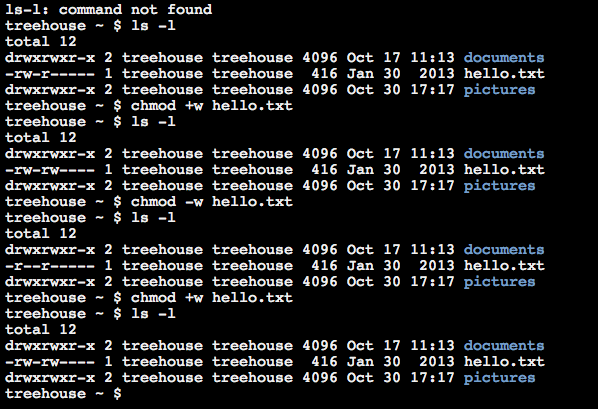Welcome to the Treehouse Community
Want to collaborate on code errors? Have bugs you need feedback on? Looking for an extra set of eyes on your latest project? Get support with fellow developers, designers, and programmers of all backgrounds and skill levels here with the Treehouse Community! While you're at it, check out some resources Treehouse students have shared here.
Looking to learn something new?
Treehouse offers a seven day free trial for new students. Get access to thousands of hours of content and join thousands of Treehouse students and alumni in the community today.
Start your free trial
chrisskilton
1,634 PointsWhy wont adding permissions for everyone always add a permission for 'others'?
I was interested to find out if the command 'chmod +r hello.txt' would still work if any of the user/group/others already have the 'read' permission
If no users have the 'r' permission then 'chmod +r hello.txt' will add that permission for the user, group and others.
However if the 'user' already has the 'read' permission then 'chmod +r hello.txt' will add the read permission for the group but not for 'others'.
I found this was also the case with the 'w' and 'x' permissions.
This is an interesting inconsistency and I wonder if anyone knows why this is the case?
For example perhaps the idea is that if only 'user' of 'group' has a permission then the assumption is that someone has previously chosen not to grant permission to everyone.
On this basis the 'chmod +r' command will extend the permission to the group but not 'others' as a means of preventing accidental 'oversharing' of permissions?
4 Answers
Nate Meyer
3,887 PointsOh, I know what's up! We can blame the umask.
The umask on the console foundation systems (which are Ubuntu) is different than where I tested (OS X and CentOS). Here's an example for a Console Foundations console:
# with the default umask
treehouse ~ $ umask
0002
treehouse ~ $ touch test.txt
treehouse ~ $ ls -l test.txt
-rw-rw-r-- 1 treehouse treehouse 0 Oct 30 22:52 test.txt
treehouse ~ $ chmod 644 test.txt
treehouse ~ $ ls -l test.txt
-rw-r--r-- 1 treehouse treehouse 0 Oct 30 22:52 test.txt
treehouse ~ $ chmod +w test.txt
treehouse ~ $ ls -l test.txt
-rw-rw-r-- 1 treehouse treehouse 0 Oct 30 22:52 test.txt
# and with another common umask
treehouse ~ $ umask 0022
treehouse ~ $ umask
0022
treehouse ~ $ chmod 644 test.txt
treehouse ~ $ ls -l test.txt
-rw-r--r-- 1 treehouse treehouse 0 Oct 30 22:52 test.txt
treehouse ~ $ chmod +w test.txt
treehouse ~ $ ls -l test.txt
-rw-r--r-- 1 treehouse treehouse 0 Oct 30 22:52 test.txt
So as you can see the umask influences how chmod +whateva somefile is interpreted. So I suppose the moral here is that it's best to either use octal or do the more explicit symbolic notion (chmod o+w somefile) if the vaguer syntax is causing you an issue.
Edit: Great question by the way.
Nate Meyer
3,887 Pointschmod +r somefile will add read permission for the user, group, and all users by default.
To illustrate, if the file owner and group already have read permsissions:
$ chmod 640 test.txt
$ ls -l test.txt
-rw-r----- 1 nate staff 0 Oct 30 13:46 test.txt
$ chmod +r test.txt
$ ls -l test.txt
-rw-r--r-- 1 nate staff 0 Oct 30 13:46 test.txt
And if only the owner has read, +r still gives read to both the group and all users:
$ chmod 600 test.txt
$ ls -l test.txt
-rw------- 1 nate staff 0 Oct 30 13:46 test.txt
$ chmod +r test.txt
$ ls -l test.txt
-rw-r--r-- 1 nate staff 0 Oct 30 13:46 test.txt
Is that different from your experience? I tried both on OS X and CentOS and had the same outcome.
In general, what I find most useful is to specify file permissions in octal. It's a little harder to wrap your head around at first, but this Wikipedia article describes both the numeric and symbolic permissions notations well (see the 'Notation of traditional Unix permissions' section).
chrisskilton
1,634 PointsHi Nate,
Thanks for your reply and for providing the example. It does make sense that the command would operate consistently and simply add the permission for the user, group and all others.
On this basis I think I may be experiencing some kind of a bug or unusual configuration in the console provided on Treehouse.
Here is a screenshot from my Treehouse console:
As you can see the command 'chmod +w hello.txt' doesn't add the 'write' permission to all users. As you say using octal notation to specify permissions is clearly a lot simpler and faster (and I watched that video shortly after posting this question!).
Nevertheless I thought this was an interesting anomaly. Is this a bug or perhaps a custom configuration of some kind?
chrisskilton
1,634 PointsThanks for the detailed answer Nate, much appreciated.
As an aside I don't know if there is a plan for a more comprehensive console course but I think that would be really useful.
Nate Meyer
3,887 PointsI'd like to see us do that too!

Luis Marsano
21,425 PointsLuis Marsano
21,425 PointsThe POSIX standard clarifies this.
The GNU manual puts this in plainer language.
a controls all users unconditionally whereas none observes the umask. Therefore, the explicit a symbol as in
chmod a+w hello.txtshould do the trick.I think the moral here is to read the manual
man 1 chmod.